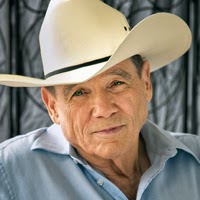Introduction
I've seen Louisiana author
James Lee Burke compared to the likes of James Patterson and
Dean Koontz. A travesty - Messrs. Patterson and Koontz churn out the
equivalent of Harlequin Romances for men. Mr. Burke
writes.
Back
here, I looked at Mr. Burke's very first book, which I wasn't madly in love with. Subsequent books are exponentially better.
Mr. Burke has written more than 30 books. Twenty of the books center around protagonist Dave Robicheaux.
Dave Robicheaux
A Cajun, Dave Robicheaux is a police detective and the owner of a recreational fishing enterprise outside New Iberia, Louisiana. He was a detective with the New Orleans Police Department til everything went to shit, and then he became an on-again, off-again detective for the New Iberia Sheriff's Department.
Most of the Dave Robicheaux books are based in New Iberia, where Dave lives, though he burns up a hell of a lot of gas and time on his forays to and from New Orleans, working on cases that may have started in New Iberia, but have tentacles elsewhere.
Dave's character
Dave Robicheaux is a man with cracks in his foundation. He was a low-bottom alcoholic while with the New Orleans Police Department, and he had a relapse or two after he joined Alcoholics Anonymous.
Ghosts from Viet Nam invade his dreams, though less so after he stopped drinking.
Dave had a mother who loved him and whom he loved, but she had some demons, and he suffered collateral damage from those demons. He admired his father, who was known as a guy who enjoyed a good brawl.
At the point I am now in the series, Dave has had three wives. The first left him because of his drinking and other issues. The second, Annie, was murdered. The third, Bootsie, is alive and still married to Dave. She has lupus.
Dave has a daughter he saved from a plane crash (murder), in which the plane plunged into the Gulf and drowned her mother and the other passengers. A Guatemalan girl, witness to atrocities in her village, Dave was able to adopt her through the magic of literary license. He named her Alafair.
Time span
- The first Dave Robicheaux book was published in 1987; the most recent (as of this writing) in 2013.
- Dave was born in the 1940s and as noted above, served in Viet Nam.
- Mr. Burke was born in 1936, and spent most of his youth in the Texas-South Louisiana coast region.
I draw your attention to this because:
- Dave Robicheaux does grow older with the passage of time in the book series.
- Mr. Burke, as he channels through Dave, shares some particular worldviews on Louisiana and the people within and without.
- There is a stream of time where you can see how embedded was~has been~is the culture of slavery, indentured servitude, oppression, and almost thoughtless dismissal of human life in our society
Themes
Certain threads wind through Dave Robicheaux' stories:
- Alcoholism, drug addiction, Alcoholics Anonymous
- Southern Louisiana geography and culture
- The underclass in particular and class in general
- Violence
- The insidious, institutionalized inhumanity against man that is part of southern Louisiana's history
- Environmental issues
- Living with lupus
I don't know if there are many authors who portray the underclass with... I don't know ... humanity. Mr. Burke does so, albeit without tenderness or sentimentality.
Missouri writer
Daniel Woodrell does. In his case, he tells his stories through the eyes of the societal stratum we like to call trash.
About Clete
Clete Purcel, who I suppose one could call Dave's sidekick, is in my opinion, a psychopath. Damned if in every Dave Robicheaux novel, Dave doesn't say Clete was the best homicide detective he ever knew. He never gives a scrap of evidence of this, however, and there's nothing in Clete's actions that support Dave's statement. Unless you consider urinating in a man's car or demolishing a guy's house with a bulldozer good detective work.
This dumb loyalty to Clete the psychopath is indicative of a chronic flaw, I believe, in Mr. Burke's books. In his very first book,
Half of Paradise, one of the protagonists allies himself with a complete asshole, no matter how much this costs him in prison. In the
Lost Get-Back Boogie, same thing - our hero will not let go of his loser, crazy-ass "friend" til the very end.
... but no one's perfect.
I'm still as engaged in the Dave Robicheaux series now as I was from the start. I thank my mother for pointing me in his direction.
This is the first in a series on Louisiana as seen through the eyes of Dave Robicheaux as channeled by James Lee Burke.
Coming soon --> Part 2: Dave Robicheaux and the Northern Louisianans



















